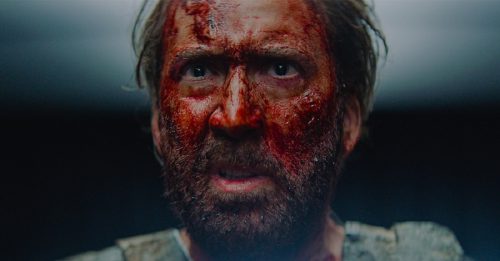Mandy: Starless, by David Bax
Most of the graphic design associated with Panos Cosmatos’ Mandy that’s already out there (one-sheet, title treatment, etc.) is very metal. We’re talking 1980s Dio, manly men with giant swords and demons to use them on kinda metal. In case you were even a little bit skeptical, rejoice in the knowledge that there is truth in advertising. Opening with an extended, noodly riff and remaining music-forward throughout, this movie is an onslaught that any hesher worth their faded Slayer bumper sticker would approve of.
Nicolas Cage stars as Red, a lumberjack who spends his downtime in rural domestic bliss with his wife, Mandy (Andrea Riseborough), a fantasy novel geek who favors Motley Crue and Black Sabbath t-shirts. When Mandy catches the eye of a backwoods cult leader (Linus Roache), she’s kidnapped and, refusing to comply, killed. Cosmatos avoids aping the exploitation of women’s bodies that marks so much of the heavy metal (and Heavy Metal) to which he’s paying homage but Mandy’s death is an unfortunately textbook case of fridging. Now Red must seek revenge on the cult and the biker demons they worship. With a little help from Bill Fucking Duke, to boot.
Cosmatos’ previous feature, Beyond the Black Rainbow, was visually splendid and Mandy both continues and heightens that trend with its psychedelia (like apparently shooting through planes of glass with light reflections on them) and its composite shots that make the forest look like an alien landscape. It’s an improvement on Beyond the Black Rainbow in other ways, too. Where that movie got bogged down in overindulgence, Mandy keeps the viewer engaged with its emotionally motivated narrative (aided by an impassioned lead performance from Cage) and a surprising number of laughs. I could’ve done without the movie’s apparent opinion of sexual submissiveness as an unforgivable character flaw, though.
If there’s something deeper, thematically, going on with Mandy (there’s probably not and that’s okay), it’s definitely to be found in the repeated depiction of substance abuse. Seen refusing a beer in the opening minutes, Cage goes all-in following Mandy’s death, first downing an entire bottle of liquor while crying ferociously in his underwear (a tailor-made Nic Cage supercut moment) and later sampling some kind of goopy super-LSD. Maybe his whole story is a metaphor for a widower falling off the wagon. Or maybe it’s all just an excuse to splatter Cage with blood and let him have a chainsaw fight with a psycho hippie.
At its core, despite being unreservedly far out, Mandy is a pretty conventional revenge story. But Cosmatos has taken those conventions back to their primordial state, fashioning something that goes deeper than the archetypal. It’s downright mythical.































